Introduction
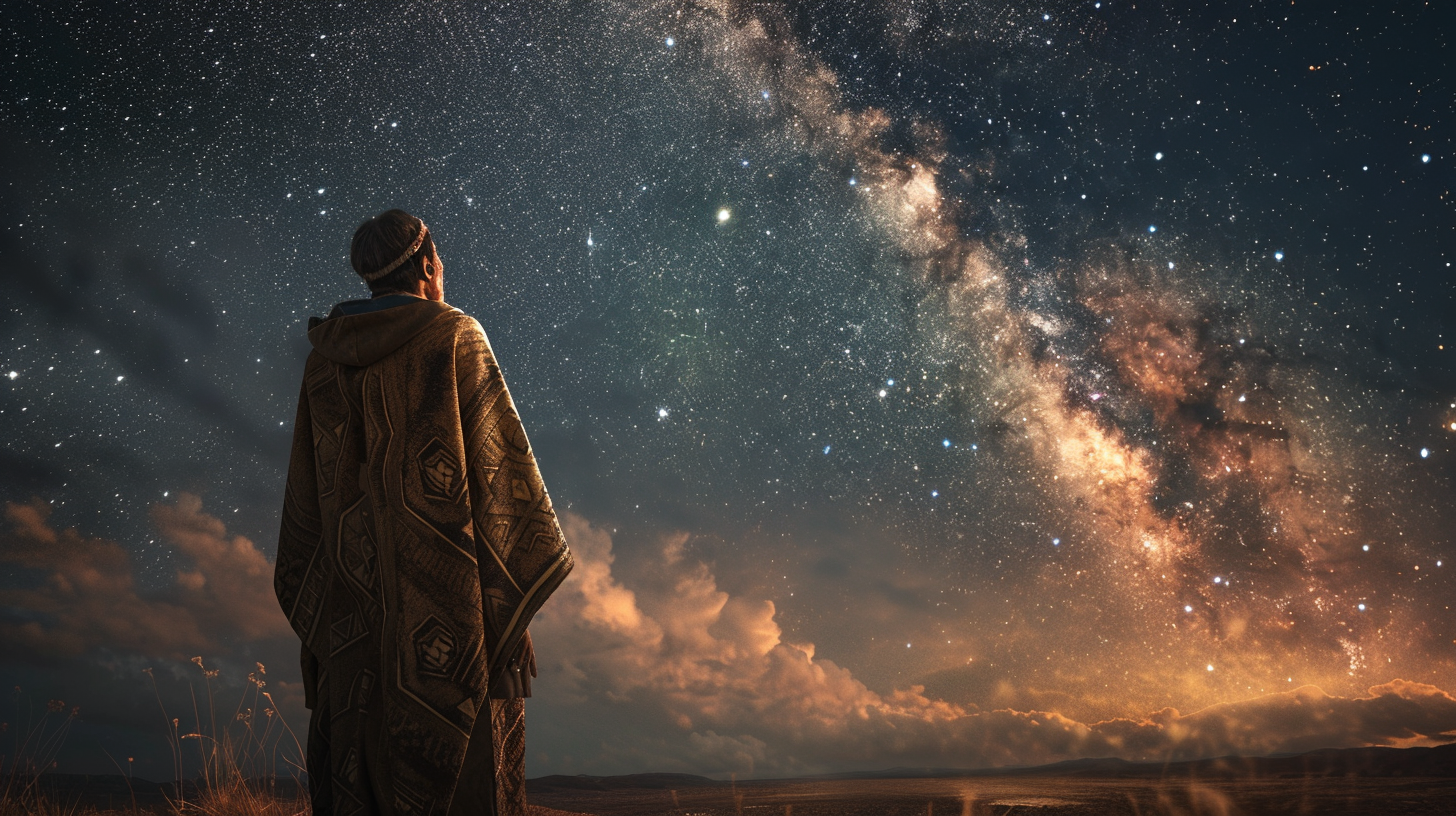
What if the stars above us are not just colossal orbs of incandescent plasma, but ancient guides charting our destiny? Across the epochs, our ancestors gazed into the night sky, not merely as observers but as seekers of meaning and wisdom. How did these ancient civilizations perceive the celestial patterns above, and what profound insights can we glean from their cosmic understanding?
The term ‘ancient wisdom’ encapsulates more than just old knowledge; it represents a deep, interconnected understanding of the cosmos as observed and interpreted by various civilizations—Egyptians, Mayans, Greeks, and Indigenous cultures. These societies, each with their unique cosmological insights, looked to the heavens for guidance in both the mundane and the mystical. Today, amidst our scientific advancements, these ancient perspectives continue to echo, offering rich philosophical and spiritual insights that challenge our contemporary view of the universe.
This article embarks on an explorative journey to uncover how ancient views of the cosmos continue to influence modern spirituality and scientific thought. By bridging millennia-old insights with today’s perspectives, we invite you to rediscover the cosmos not just as a subject of scientific inquiry but as a source of wisdom. As we delve into the cosmic views of notable ancient civilizations, we aim to weave together the threads of the past and present, revealing how ancient wisdom can enrich our modern understanding of the universe and our place within it.
By setting this foundation, we pave the way for a deeper exploration of specific ancient teachings on the cosmos, promising insights that may not only enlighten us but also inspire a greater appreciation of the profound connection between the ancient sky gazers and ourselves. Through this journey, we aspire to transform your perception of the stars above, presenting them as a timeless tapestry woven with the threads of knowledge, spirituality, and science.
Foundations of Ancient Cosmic Wisdom
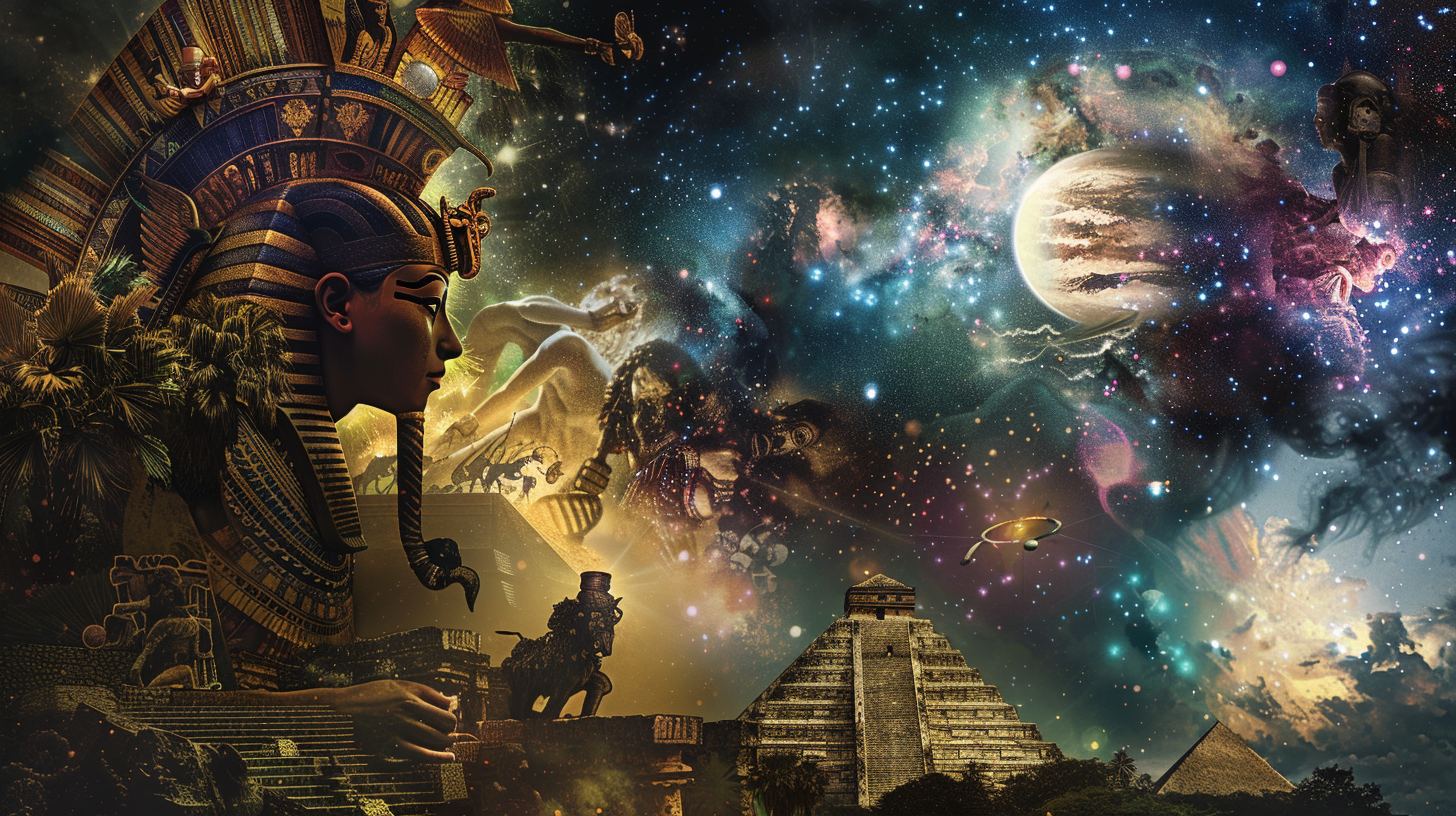
Defining Ancient Wisdom
Ancient wisdom encompasses far more than historical facts and figures; it represents a profound and holistic understanding of the cosmos—an integration of life, spirituality, and the universe itself. This wisdom, distilled over centuries, was not solely concerned with the mechanics of celestial bodies, but with their influence on human life and the natural world. For instance, the Babylonians developed complex mathematical models not just to predict celestial events but to understand divine will. In Polynesian cultures, navigators used the stars to chart vast oceanic voyages, linking sky to sea in a seamless expanse of knowledge. Meanwhile, the Celts viewed celestial movements as manifestations of their gods and crafted rituals to honor the harmony between earth and sky. These examples illustrate a tapestry of diverse beliefs and practices, each contributing uniquely to the ancient understanding of the cosmos.
Key Philosophies and Cultures
Throughout history, several civilizations have stood out for their profound cosmic wisdom:
Egyptians: The Egyptians revered the sky goddess Nut, who was believed to swallow the sun each evening and give birth to it each morning, illustrating their view of the cosmos as a living, cyclical entity.
Mayans: Renowned for their astronomical achievements, the Mayans developed sophisticated calendars that not only measured time but also served as portals to understanding the divine orchestration of the universe.
Greeks: Greek philosophers like Plato and Aristotle viewed the cosmos through a lens of philosophical inquiry, debating the nature of celestial bodies as perfect forms, influencing Western scientific and philosophical thought.
Indigenous Tribes: Many Indigenous tribes, such as the Native Americans, embraced a nature-centric spirituality, where every element of nature, including celestial bodies, was seen as part of a grand, interconnected system.
Common Themes and Differences
Across these cultures, common themes such as astrology, the spiritual significance of celestial events, and cosmological myths pervade, each aiming to explain the structure of the universe and its impact on human existence. While Egyptians integrated celestial cycles into their theological narratives, the Mayans saw them as a means to divine the future, reflecting a shared quest to find order in the cosmos. However, their interpretations and practices varied greatly—Egyptians built monumental pyramids aligned with stellar movements, while Mayans constructed observatories like El Caracol to track celestial alignments. These differences underscore a universal human quest to decode the celestial language, each culture adapting its understanding to fit its environment and needs.
Cosmic Insights from Key Ancient Civilizations
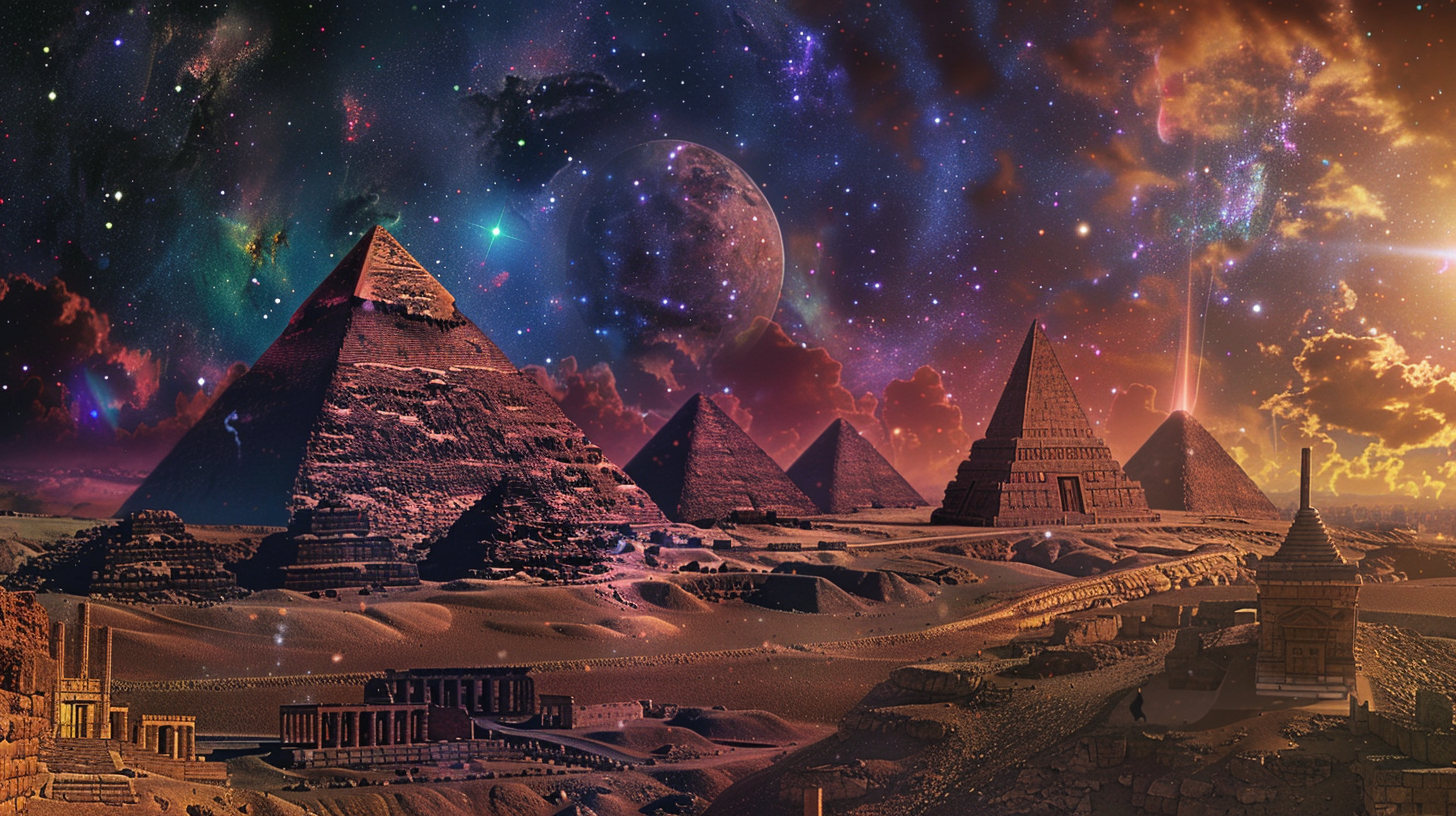
Egyptian Cosmology:
The ancient Egyptians perceived the cosmos not just as a space for celestial bodies but as a realm deeply intertwined with their daily life and religious beliefs. The sun god Ra and the sky goddess Nut were central to Egyptian cosmology, influencing everything from agricultural cycles to societal norms. Their belief in the celestial journey of Ra, traveling across the sky by day and through the underworld by night, shaped their concepts of death and rebirth, profoundly affecting their burial practices. This is exemplified by the precise alignment of the pyramids with specific stars, intended to guide the pharaohs’ souls to the heavens. Such practices reflect a sophisticated understanding of celestial patterns, which were seen not only as natural phenomena but as divine processes integral to the afterlife’s navigation.
Mayan Astronomical Achievements:
The Mayans’ grasp of astronomy was remarkably advanced, with their sophisticated calendrical systems and deep knowledge of celestial mechanics playing a crucial role in both their agricultural practices and religious rituals. The observatory at Chichen Itza, for example, allowed Mayan astronomers to observe celestial events with great accuracy, aiding in the precise timing of sowing and harvesting cycles. These celestial observations were also pivotal in the planning of significant religious ceremonies, underpinning the Mayans’ belief in the cyclical nature of time and its embodiment within the cosmos. The spiritual significance attached to these practices reveals a culture that viewed the cosmos as a living entity, intimately linked with the earthly and divine.
Greek Philosophical Contributions:
Greek philosophers like Plato and Aristotle significantly shaped Western cosmic views with their theories. Plato’s theory of Forms postulated that celestial bodies were perfect forms, representing ideal proportions and harmony in the universe. Aristotle’s geocentric model, placing Earth at the universe’s center, influenced astronomical thought for centuries. These philosophical musings were not mere speculations; they formed the basis of a worldview that saw the cosmos as a complex structure governed by underlying principles that could be understood through reason and observation. Their work laid the foundational thoughts that would later influence the scientific revolution, altering the course of Western thought about the universe.
Indigenous Cosmic Connections:
Indigenous cultures worldwide have maintained a profound and holistic connection with the cosmos, integrated seamlessly into their daily lives and spiritual practices. For instance, the Native American Medicine Wheel and the Aboriginal Dreamtime stories encapsulate their understanding of life as a continuous, interconnected flow of energy between the earth and the cosmos. Such beliefs are reflected in their rituals, social organization, and ecological practices, which demonstrate a sustainable way of living in harmony with the natural world. These practices emphasize a reciprocal relationship with the cosmos, not as a dominion to be conquered but as a sacred space to be
Circles of Enlightenment: Exploring the Mandala's Cosmic Journey
Spiritual and Philosophical Implications

Cosmic Spirituality:
Ancient civilizations did not view the cosmos merely as a collection of celestial bodies moving in space; they saw it as a fundamental part of their spiritual essence and existential narrative. For example, the Vedic texts of India describe the universe as a cosmic dance of deities, each celestial body imbued with divine significance, influencing human life and the environment. This profound connection between the cosmos and spiritual life persists in modern practices. Astrology, for instance, derives directly from such ancient cosmic observations and remains integral to spiritual practices around the world, providing guidance to millions by interpreting celestial influences on personal and collective fate. Similarly, meditation practices that involve celestial alignments during solstices and equinoxes reflect these ancient cosmic views, suggesting a continued belief in the significant spiritual influence of celestial bodies.
Philosophical Insights:
The philosophical inquiries inspired by ancient cosmic wisdom often contemplate the nature of existence, the universe’s purpose, and the human role within it. These questions have been pivotal in shaping philosophical discourse through the ages. Ancient Greek philosophers like Plato discussed the cosmos as a creation of a higher rational order, which still resonates in modern philosophical debates about metaphysics and existentialism. Today, thinkers like Thomas Nagel and Derek Parfit engage with these ancient ideas, pondering human consciousness and ethical living within the universe’s vastness. This ongoing dialogue highlights the timeless relevance of ancient cosmic wisdom, underscoring its impact on modern existential and ethical discussions.
Modern Integration:
Ancient cosmic insights continue to influence contemporary spiritual and philosophical practices in several profound ways. For example, eco-spirituality movements draw heavily on indigenous beliefs in the sacredness of the earth and its cosmic connections, advocating for a life that respects our planet as part of a larger cosmic order. In academia, interdisciplinary studies involving cosmology, philosophy, and theology explore how ancient cosmologies can inform modern scientific understandings of the universe. These integrations, while enriching, also present challenges, such as reconciling linear, scientific perspectives with cyclical, holistic ancient views. Despite these conflicts, the integration of ancient wisdom offers a richer, more diverse understanding of our world, encouraging a synthesis that could lead to more sustainable ways of living.
Unlocking Dialogues with the Cosmos: Mastering Universal Communication
The Legacy of Ancient Cosmic Wisdom

Influence on Modern Science:
Ancient astronomy has not only intrigued minds through the ages but also laid foundational principles that continue to underpin modern scientific disciplines like astronomy, physics, and even space exploration. The Babylonians, for instance, developed sophisticated mathematical techniques to predict celestial events, which directly influenced the astronomical methods used today. Similarly, the geometric models of the cosmos proposed by Greek philosophers and astronomers, such as those by Aristarchus who posited heliocentric theories, have shaped the very fabric of modern scientific thought and practice. These ancient contributions continue to inspire contemporary astrophysics and cosmology, encouraging a continuous reevaluation of our knowledge about the universe and driving ongoing research and discovery that challenge and expand our current scientific paradigms.
Cultural Resurgence:
In today’s world, there is a marked resurgence of interest in ancient cosmic wisdom, reflected in both cultural and spiritual contexts. This revival is seen in the growing popularity of astrology, which, despite its ancient roots, finds relevance in the lives of millions today, offering guidance and perspective. Additionally, meditation retreats that align with celestial events and cultural festivals celebrating solar and lunar eclipses are testament to a collective desire to reconnect with cosmic rhythms. This cultural resurgence can be interpreted as a response to the modern existential search for meaning, a yearning to tie our fast-paced, technology-driven lives to something enduring and profound – the timeless dance of the cosmos.
Preservation and Education:
Efforts to preserve ancient cosmic wisdom are critical in maintaining the continuity of this knowledge. UNESCO World Heritage sites that protect places like Stonehenge and the Jantar Mantar observatories underscore the global recognition of the value of these ancient insights. Furthermore, educational initiatives that weave ancient astronomical knowledge into modern curricula are burgeoning. Universities and educational platforms offer courses that explore the intersections of science, philosophy, and spirituality, reflecting a holistic approach to learning and understanding. The challenges of preserving these ancient teachings are paralleled by their potential to enrich educational narratives and ensure that this wisdom is not lost to future generations.
Engaging with Ancient Wisdom Today
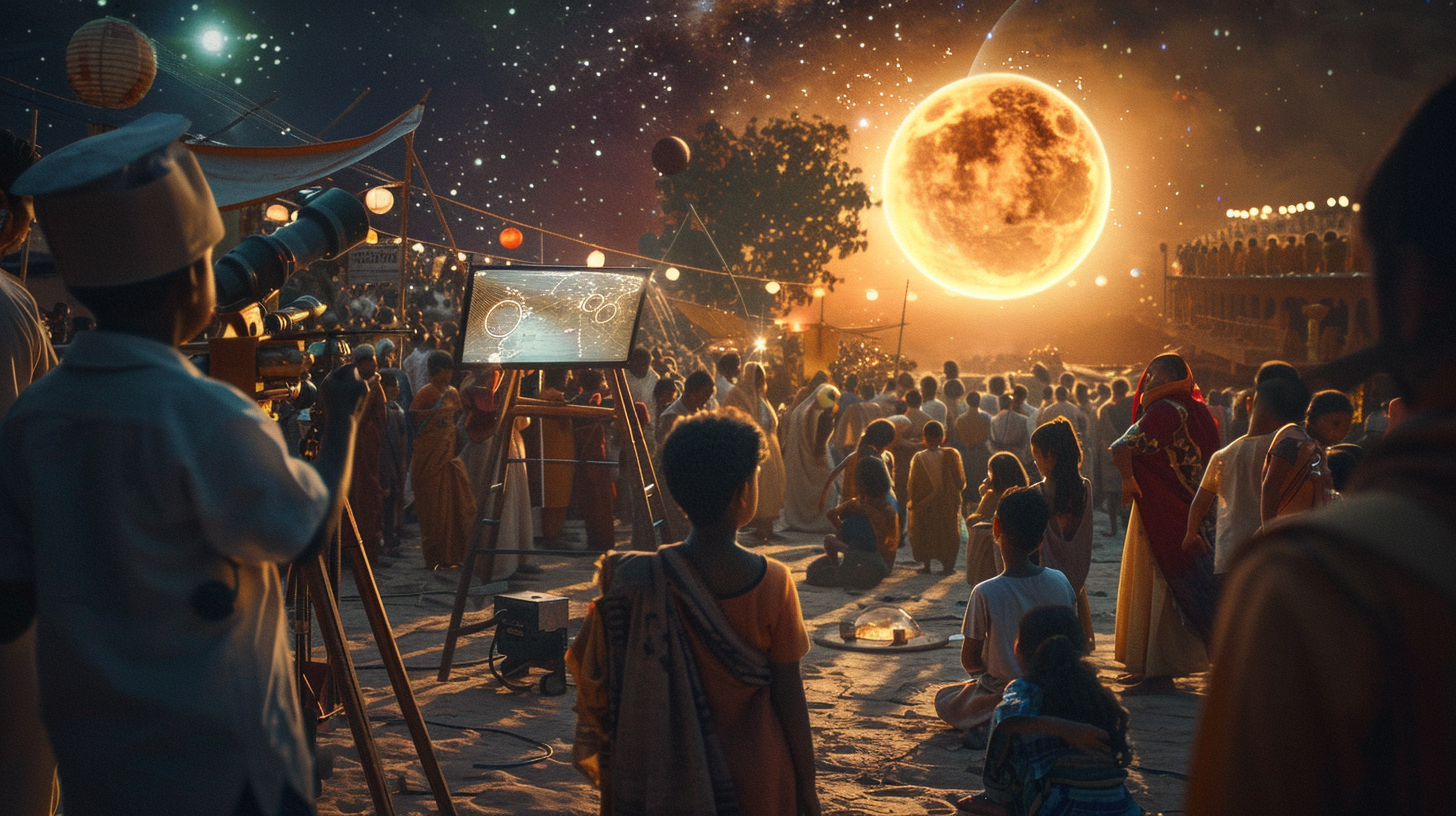
In our fast-paced modern world, ancient cosmic wisdom offers a grounding perspective, helping us reconnect with the rhythms of the universe. One practical way to incorporate this wisdom is through the application of astrological principles. For instance, understanding planetary alignments can help inform personal decision-making or reflection periods. Additionally, adopting ritualistic practices from ancient cultures, such as meditating during the new moon or setting intentions during the winter solstice, can enhance mindfulness and provide a deeper sense of connection to the natural world. Observing these celestial events allows us to pause and reflect on our place within the cosmos, fostering a sense of unity with the universe that often eludes us in everyday life.
Further Reading and Resources:
For those eager to dive deeper into ancient cosmic wisdom, a wealth of resources is available. Books like “Cosmos and Psyche” by Richard Tarnas provide insightful connections between planetary movements and personal psyche, suitable for both newcomers and seasoned astrological enthusiasts. Documentaries such as “The Universe” series offer a visually stunning exploration of astronomical phenomena from ancient to modern times. Online courses on platforms like Coursera or The Great Courses also offer comprehensive lessons on ancient astronomy. Visiting historical sites like the Mayan ruins or modern planetarium shows can dramatically enhance one’s understanding of how ancient peoples interpreted the cosmos, offering a direct, immersive experience.
Community Engagement:
Engaging with a community can significantly enrich the journey into ancient wisdom. Participating in forums like The Mystica or discussion groups on platforms like Meetup can connect you with others who share a fascination with ancient cosmologies. Attending conferences or workshops, such as those offered by the Archaeoastronomy Society, bridges the gap between ancient wisdom and contemporary science, offering new insights and connections. These gatherings provide not only knowledge but also support and inspiration from like-minded individuals.
Conclusion: Reflecting on Ancient Cosmic Wisdom
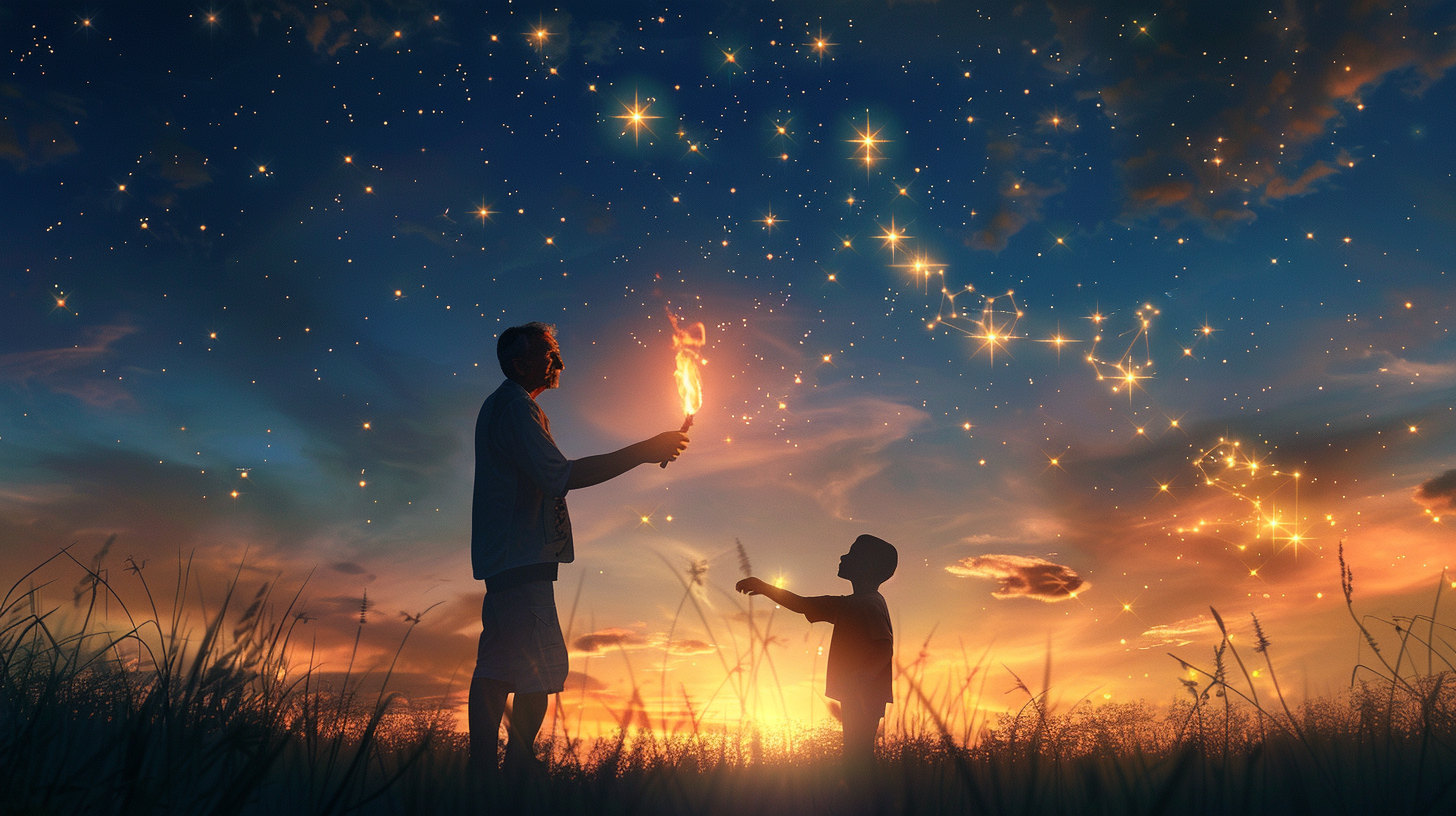
As we conclude our journey through the cosmic views of ancient civilizations, we’ve uncovered how profoundly the Egyptians, Mayans, Greeks, and Indigenous tribes shaped our understanding of the cosmos. These cultures, each with their unique astronomical insights, have not only contributed to the scientific knowledge we cherish today but also to the spiritual practices that many still observe. From the precise alignments of the Mayan calendars to the philosophical inquiries of the Greeks and the sacred rituals of Indigenous cultures, these ancient perspectives offer a rich tapestry of knowledge. The integration of such wisdom into modern science, the resurgence of interest in these cultural practices, and their practical applications today highlight a continuing dialogue between the ancient and the modern, revealing the cosmos as an ever-relevant wellspring of inspiration and understanding.
Reflect on how the harmony observed in the celestial dance might mirror the potential harmony within our own lives. How might the thoughtful contemplation of ancient cosmic views change the way you view your place in the universe today?
I encourage you to let the ancient wisdom discussed here influence your understanding of the universe and your place within it. Whether it’s by observing the natural cycles that govern our world, engaging in community discussions about spirituality and science, or exploring further through books and documentaries, there’s much to gain from continuing this exploration. Visit historical sites, participate in forums, or attend workshops to connect with others who share this curiosity. Embrace these opportunities to expand your perspective and integrate these timeless insights into your daily life, enriching your modern experience with the wisdom of the ages.







